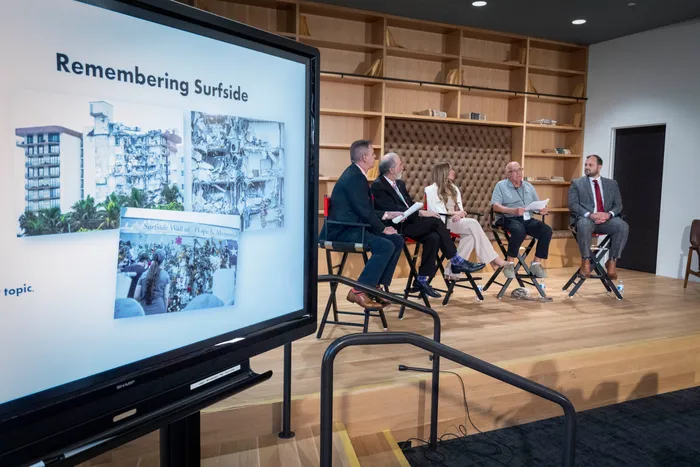Condo Owners in Crisis: Town Hall Reveals Shocking Truths About Florida’s New Laws
The tension was clear before the first speaker even stepped up. Dozens of condo owners, board members, and local residents filled the seats at the West Palm Beach Library auditorium Tuesday evening, eager — and anxious — to talk about an issue that’s been quietly shaking their lives for months: Florida’s condo crisis.
The event, hosted by The Palm Beach Post, wasn’t just another community gathering. It was a much-needed town hall aimed at breaking down the complicated and often overwhelming realities of Florida’s new condo laws — and what they mean for everyday people trying to stay in their homes.
A Crisis Born from Tragedy
Most people at the event understood where this started. After the devastating collapse of the Champlain Towers South in Surfside back in 2021, lawmakers moved swiftly to make sure it would never happen again. That led to new rules requiring older condo buildings to complete structural inspections and set aside significant reserve funds for future repairs.

But while the intention was good, the outcome for many owners has been painful.
“These laws were meant to protect us, and I get that,” said Margaret Levin, a 68-year-old condo owner from Lake Worth Beach. “But now I’m staring down a $700-a-month increase in my assessment, and I just don’t know how I’m going to afford it.”
The Big Questions
Throughout the evening, a panel of legal experts, property managers, and housing advocates fielded questions from the crowd — questions that spoke to the real fears many condo residents now live with daily.
Why are insurance premiums skyrocketing?
What happens if our condo association can’t come up with the money?
Is there any help for seniors on fixed incomes?
Attorney Alan Schwartz, who specializes in condo law, said one of the biggest problems is confusion. “There’s a lot of misunderstanding out there about what’s legally required versus what boards are recommending to stay ahead of future liabilities,” he explained. “That gap in knowledge is fueling panic.”
The Financial Squeeze
One of the evening’s biggest themes was the financial pressure many condo owners are now facing. For buildings constructed before 1992 — and especially those with aging infrastructure — the cost of complying with new state mandates can reach hundreds of thousands, even millions of dollars.
And guess who pays for that? The residents.
“Some people are getting hit with $20,000 special assessments,” said one man from Delray Beach. “That’s not just inconvenient. That’s life-changing. That’s sell-your-home money.”
Real estate experts warned that these costs could drive people out of their homes and flood the market with properties that many won’t want to buy due to upcoming repair expenses. Others expressed fear that these pressures could disproportionately hurt retirees and working-class residents.
A Need for Solutions, Not Just Talk
Despite the seriousness of the issue, the tone in the room wasn’t all doom and gloom. Several speakers emphasized the importance of organized community action — including pushing local lawmakers to offer relief or revise the more rigid aspects of the law.
“There’s room for balance,” said one panelist. “We want safety, of course, but we also need solutions that don’t bankrupt people.”
Some suggested creating state-backed financing programs, grants for low-income homeowners, or delaying certain deadlines to give buildings time to comply. Others pushed for more education and transparency within condo associations, so owners aren’t left in the dark until it’s too late.
What’s Next?
The Palm Beach Post said this town hall is just the beginning. More events are in the works, aimed at keeping the conversation going and making sure residents have access to the information and resources they need.
As the town hall wrapped up, many attendees lingered, talking in small groups, swapping contact info, and planning to organize more locally. “We’re all in this together,” someone said. “That’s the only way we’re going to get through it.”
For people across Palm Beach County — and throughout the state — this issue isn’t just a policy debate. It’s about keeping a roof over their heads.


Comments are closed, but trackbacks and pingbacks are open.